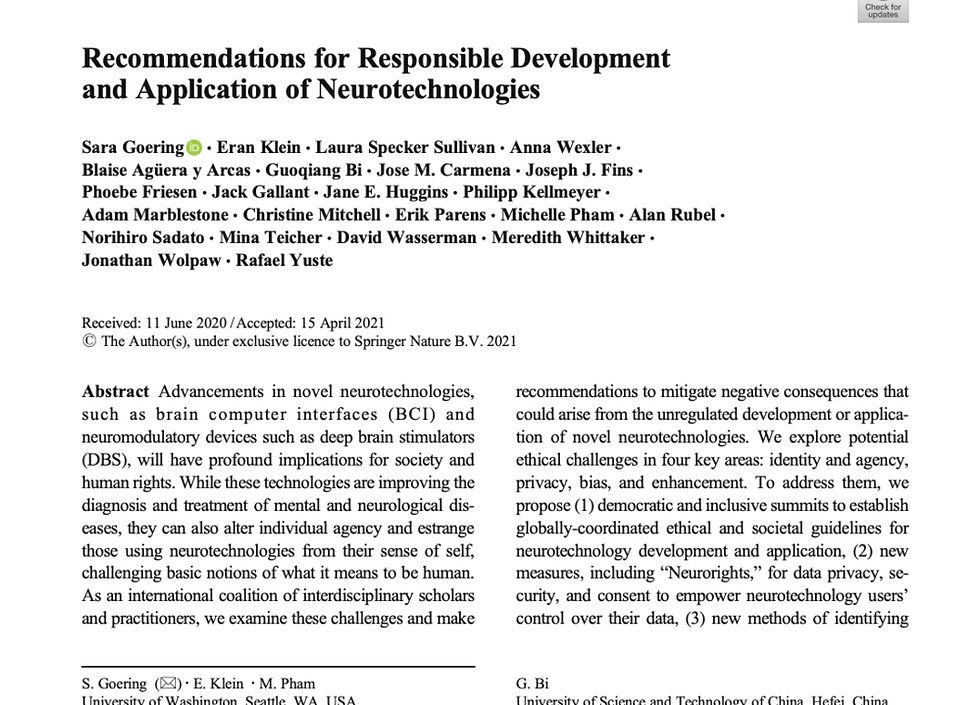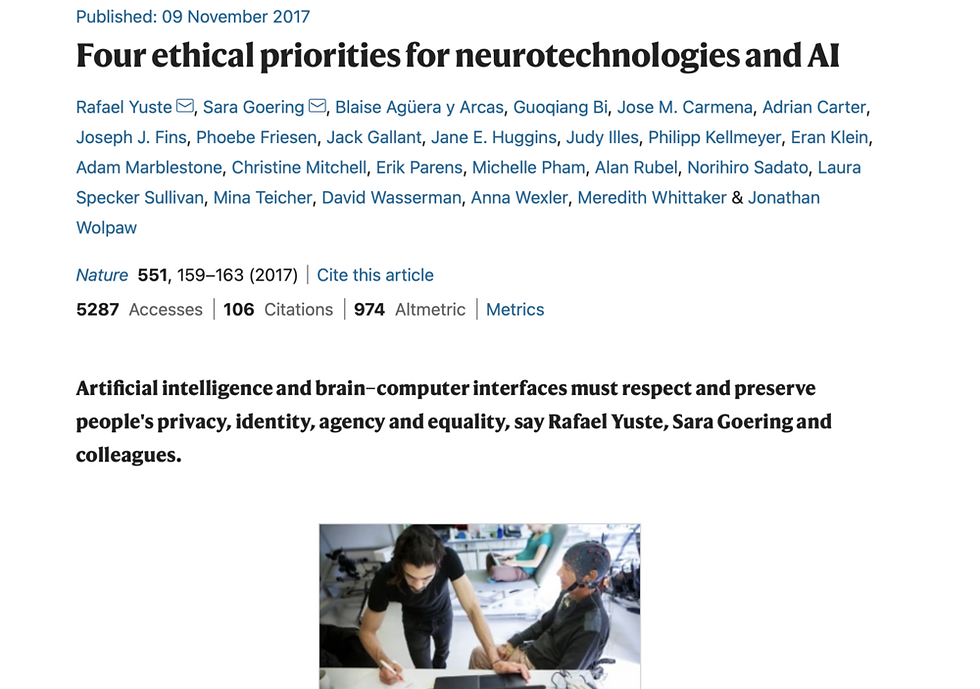Research
Research
- Page 1
June 25, 2025
Mental Privacy: Navigating Risks, Rights and Regulation
In this peer-reviewed article, Łukasz Szoszkiewicz and Rafael Yuste explore growing risks to mental privacy and and the regulatory landscape for neurotechnologies. The authors outline the current regulatory landscape as well as key steps for where regulatory action needs to move in the coming years.
Łukasz Szoszkiewicz and Rafael Yuste
May 13, 2025
Neurotechnology & Privacy: The Battle for Your Brain Is Here
In this edition of the Washington Lawyer’s "Taking the Stand," where D.C. Bar members address important legal issues, Jared Genser discusses the impact of emerging neurotechnologies on lawyers and the legal field at large. The Washington Lawyer is the official publication of the District of Columbia Bar, and has a readership of over 110,000 legal professionals.
Jared Genser
December 2, 2024
Protecting Neural Data Privacy—First, Do No Harm
Jumpstarted by the US BRAIN Initiative launched by President Barack Obama in 2013, advances in neurotechnologies, defined as methods to monitor or alter the activity of the nervous system, have outpaced regulatory governance at all levels. Such advances in neurotechnologies in the last 2 years alone include deeper capabilities to enhance working and long-term memory to decode high-resolution mental imagery from functional magnetic resonance imaging data and the reconstruction of internal language from noninvasive brain recordings. At scale, recent years have also seen the proliferation of consumer neurotechnology devices, with now some 30 on the market, collecting neural data with promises such as to enhance cognition, improve sleep, deepen meditative states, and balance mood, among other indications. Furthermore, companies, such as Meta, Apple, Snap, and Neuralink, have each patented or are developing wearable neurotechnologies that will soon enter the market at world population levels never seen before. Our concerns lie with the latter 2 categories, which remain essentially without any regulation.
Sean Pauzauskie, Jared Genser; Rafael Yuste
December 31, 2023
Prime Papers: Advancements in Neurotechnology 2023
Compiled by our neuroscientists, this spreadsheet contains the most recent and significant research papers involving neurotechnology. Not a scientist? No need to worry! Questions addressed, methods utilized, and ultimate findings have been summarized for you.
Compiled by
September 11, 2023
Advocating for Neurodata Privacy and Neurotechnology Regulation
Neurotechnology has the potential to revolutionize science and medicine, but it also raises serious ethical concerns, such as the misuse of neurodata. To protect personal neuroprivacy and ensure the responsible development of this field, we advocate for ethical and human rights guidelines, technical safeguards, and regulatory reforms
Rafael Yuste
January 10, 2023
Neuro-Rights and New Charts of Digital Rights: A Dialogue Beyond the Limits of the Law
In this article, the authors address some of the most pressing issues that stem from the relationship between the technological advancements of the twenty-first century and legal regulation. The development of neurotechnology and artificial intelligence (AI), while offering considerable opportunities for the betterment of social life, also poses unprecedented risks.
Rafael Yuste, Tomás de la Quadra-Salcedo, and Miguel García Fernández
March 1, 2022
A Technocratic Oath
While the development of emergent neurotechnology and AI has therapeutic potential, it also raises various ethical and societal consequences, putting the mental privacy, identity and agency of citizens potentially at risk. As one approach to provide ethical guidelines to novel neurotechnologies, we propose a “Technocratic Oath,” as a pledge of simple, fundamental ethical core principles to be adopted by Neurotechnology developers and the industry.
María Florencia Álamos, Leonie Kausel, Clara Baselga-Garriga, Paulina Ramos, Francisco Aboitiz, Xabier Uribe-Etxebarria & Rafael Yuste
April 29, 2021
Recommendations for Responsible Development and Application of Neurotechnologies
A new article published in Neuroethics, on recommendations to mitigate the negative consequences that could arise from the unregulated development or application of novel neurotechnologies.
Sara Goering, Eran Klein, Laura Specker Sullivan, Anna Wexler, Blaise Agüera y Arcas, Guoqiang Bi, Jose M. Carmena, Joseph J. Fins, Phoebe Friesen, Jack Gallant, Jane E. Huggins, Philipp Kellmeyer, Adam Marblestone, Christine Mitchell, Erik Parens, Michelle Pham, Alan Rubel, Norihiro Sadato, Mina Teicher, David Wasserman, Meredith Whittaker, Jonathan Wolpaw, and Rafael Yuste
November 9, 2017
Four ethical priorities for neurotechnologies and AI
Artificial intelligence and brain–computer interfaces must respect and preserve people's privacy, identity, agency and equality, say Rafael Yuste, Sara Goering and colleagues
Rafael Yuste, Sara Goering, Blaise Agüera y Arcas, Guoqiang Bi, Jose M. Carmena, Adrian Carter, Joseph J. Fins, Phoebe Friesen, Jack Gallant, Jane E. Huggins, Judy Illes, Philipp Kellmeyer, Eran Klein, Adam Marblestone, Christine Mitchell, Erik Parens, Michelle Pham, Alan Rubel, Norihiro Sadato, Laura Specker Sullivan, Mina Teicher, David Wasserman, Anna Wexler, Meredith Whittaker & Jonathan Wolpaw









.png)